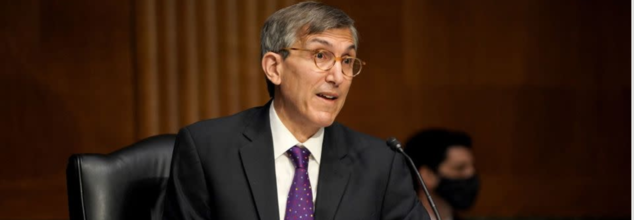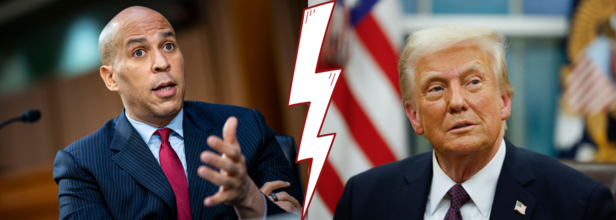
Image Credit: Canva
Top Vaccine Scientist Dr. Peter Marks Ousted From FDA- Will This Shake-Up Put Vaccine Safety At Risk?
Dr. Peter Marks, one of the top FDA's leaders in vaccine regulation, is stepping down from his position as director of the Center for Biologics Evaluation and Research (CBER). His departure has sparked a debate about the future of vaccine regulation and public health policy. Marks was instrumental in leading vaccine approvals, including during the pandemic brought on by COVID-19. As the FDA makes decisions along this transition, experts wait and monitor how it could potentially affect vaccine safety and public trust.
As the head of the Food and Drug Administration's (FDA) Center for Biologics Evaluation and Research (CBER), Marks Marks played a crucial role in ensuring vaccine safety and efficacy, especially during the COVID-19 pandemic. With his announced departure, concerns are mounting over about the future of vaccine regulation in the U.S. and its potential to affect global public health.
Dr. Peter Marks' Resignation or A Forced Exit?
Dr. Marks' April 5 resignation was not voluntary, according to several sources. He was reportedly told: resign or get fired. His exit occurs under the tenure of Health and Human Services (HHS) Secretary Robert F. Kennedy Jr., a highly publicized vaccine critic.
In his resignation letter, Marks expressed deep concern about the direction of vaccine oversight under Kennedy, writing that undermining confidence in vaccines is "irresponsible, detrimental to public health, and a clear danger to our nation’s health, safety, and security." His letter further suggested that scientific integrity was at risk, accusing Kennedy of prioritizing misinformation over truth and transparency.
Since 2016, Marks has served as the head of the FDA's CBER division, guiding the approval of life-saving vaccines, such as the expedited development and authorization of the first COVID-19 vaccines under Operation Warp Speed. His work introduced mRNA technology into vaccines, which have transformed vaccine development and are being investigated for use against a variety of diseases other than COVID-19, including influenza and cancer.
Under his direction, the FDA also approved the first self-administered flu vaccine, offering a new level of protection against flu season. His time at the agency has been characterized by a focus on scientific integrity and transparency, which experts now worry will be undermined.
Kennedy's Anti-Vaccine Influence
Kennedy has been among the loudest anti-vaccine voices, often issuing inflammatory and widely discredited statements. He has challenged the safety of the COVID-19 vaccine and has been a leading force in attempts to undermine public confidence in vaccination campaigns. In 2021, he submitted a citizens petition requesting that the FDA withdraw COVID-19 vaccine authorizations, deeming them "the deadliest vaccines ever made."
His distrust of COVID-19 vaccines is not an isolated incident. Kennedy has also questioned the measles-mumps-rubella (MMR) vaccine, despite the U.S. experiencing the biggest measles outbreak since 2019. During a recent interview, he asserted that the MMR vaccine "does cause deaths every year," something refuted by the Infectious Disease Society of America, which has identified no deaths attributed to the vaccine in healthy people.
Will Vaccine Safety Be Compromised?
Public health officials are sounding the alarm that Marks' resignation could result in a radical change in vaccine regulation and policy. The FDA's CBER branch regulates not only vaccines but also blood products, gene therapies, and allergenic products. Any loss of its regulatory authority could have sweeping implications.
Issues regarding Kennedy's leadership will result in studies that will misleadingly associate vaccines with autism, a theory consistently disproven by scientific studies. Professionals caution that future research may misleadingly imply a connection between vaccines and autism, which could heighten public fear, reduce vaccination rates, and trigger further disease outbreaks.
Also, Dr. Ashish Jha, dean of the Brown University School of Public Health, characterized Marks' ouster as a loss for the FDA. "To push him out makes the FDA immensely weaker, less effective. This is not how we make America healthy," he posted on X (formerly Twitter).
The Risk of Public Health Setbacks
Marks' resignation can't have happened at a more important time. The U.S. is reeling from the increasing rate of vaccine-preventable diseases. The current multistate outbreak of measles, with its ferocity in Texas, highlights the severity of sliding vaccination rates. According to a report by the World Health Organization (WHO), more than 100,000 unvaccinated children have died last year in Africa and Asia as a result of complications related to measles. These numbers are a hard reminder of how devastating things become when misinformation surrounding vaccines spreads.
At the same time, HHS has allegedly requested the Centers for Disease Control and Prevention (CDC) to reexamine the vaccine-autism connection, in the face of overwhelming scientific agreement that no such connection exists. The action further stoked concern that Kennedy's power might result in policy that negates a half-century of scientific advancement.
What's Next for the FDA and Public Health?
With Marks' departure, the FDA will have a vacuum of leadership at a moment when public health institutions' trust is already weakened. His replacement will have to contend with upholding scientific integrity while dealing with pressures from an administration that seems more and more politicized to counter anti-vaccine sentiment.
The next few months will tell if the FDA can resist political pressure and remain committed to its mission of safeguarding public health. For the moment, experts are calling for caution, stressing the need to protect the scientific standards that have long shaped vaccine regulation in the U.S.
Marks' exit is not simply a house-cleaning in bureaucratic circles—more importantly, it signals a possible turning point in how vaccine science is weighed, approved, and disseminated to the general public. Will this be a catalyst for public health disaster or not, the struggle for vaccine science is just beginning.

(L to R) Democratic Senator Cory Booker; US President Donald Trump (Getty Images)
Senator Cory Booker's Longest Speech In History Criticizes Trump's Health Policy, Details Inside
Senator Cory Broker, a Democrat from New Jersey delivered the longest recorded speech in Senate history. This has surpassed Strom Thurmond's 1957 filibuster against civil rights legislation. Booker's speech lasted for over 24 hours and was indeed a passionate critique of Trump administration's healthcare policies, especially its proposed cuts to Medicaid and other essential health programs.
His speech was framed as a moral stand against what he described as a 'healthcare crisis' in the United States.
The Democrat's marathon address was a symbolic protest against President Donald Trump, where he warned of the "grave and urgent" moment in American history. It went on for 25 hour and four minutes. The speech started at 7pm on Monday, where he vowed to speak as long as he is "physically able" to and ended past sunset on Tuesday, at 8.05 pm.
What Was The 25-hour Speech All About?
Booker began his speech not just tied to a specific bill but aimed to delay a vote on a Democratic-led measure to overturn Trump's tariffs on Canada. His decision to speak for such an extended period was also symbolic. He opposed the idea that the longest Senate speech was held by a segregationist.
His speech was heavily focused on healthcare policy and was addressed at Trump administration's efforts to cut funding for key health programs. These included:
Medicaid Cuts: He condemned Trump's budget proposals which sought to significantly reduce Medicaid funding. He argued that such cuts could harm low-income Americans and people with disabilities.
Access to Affordable Care: He also criticized the administration's attempts to dismantle the Affordable Care Act, which he said had expanded healthcare access for millions.
Maternal and Child Health: He then went on to highlight how cuts to government health programs would disproportionately affect pregnant women, infants, and children in vulnerable communities.
Pharmaceutical Industry Influence: He also spoke abut the rising cost of prescribed drugs. He accused the administration of failing to hold pharmaceutical companies accountable for their actions.
Policies That Booker Opposed
The main focus of his speech was his opposition to Trump's repeated attempts to weaken the healthcare protections. He argued that the administration's policies often prioritized tax cuts for the wealthy, hinting that Trump administration operates like a business and not like the government of the people. These tax cuts for wealthy are made at the expense of funding essential health services. He also denounced Trump's efforts to impose work requirements on Medicaid recipients, which he said would strip millions of Americans of healthcare coverage.
What Was The Reaction Like?
As Booker went on record, there were cheers everywhere in the Senate chamber. He also acknowledged Thurmond's legacy while emphasizing that he stood in defiance of the policies Thurmond had supported. Democrats, including Senate Minority Leader Chuck Schumer also praised his stamina and message and called it "tour de force".
The White House dismissed the speech, calling it a "publicity stunt" and referencing a precious moment when Booker declared "I am Spartacus" during Brett Kavanaugh's Supreme Court confirmation hearings.
In all, Booker remained firm in his belief that this was indeed a "moral moment" and it required action. His record-breaking speech was not just about policy, but more than that. It was about defending fundamental right to healthcare for all Americans.
“This is not right or left, it is right or wrong,” he declared. “This is not a partisan moment. It is a moral moment. Where do you stand?”

Credits: Canva
World Autism Awareness Day 2025: Theme, Significance, Origin, And Importance
Every year on April 2, World Autism Awareness Day is observed. This day raises awareness about autism spectrum disorder (ASD) which is a developmental brain disorder which impacts how a person perceives and socializes with others. This condition may cause problems in social interaction and communication. The condition may also include limited and repetitive patterns of behavior.
Origin of World Autism Day
It was started in 2007, when the United Nations General Assembly designated 2 April as World Autism Awareness Day. The UN worked to promote the full realization of human rights and fundamental freedoms for autistic individuals and ensured their equal participation in society.
In fact, over the years, progress has been made and driven in large by autistic advocates who have worked tirelessly to bring the lived experiences of autistic individuals to the forefront of global discussions.
The 2007 General Assembly resolution also highlighted the need to raise public awareness of autism.
Theme of World Autism Day
The theme for 2025 is "Advancing Neurodiversity and the UN Sustainable Development Goals (SDGs)". This goal highlights the intersection between neurodiversity and global sustainability efforts and showcases how inclusive policies and practices can drive positive change for autistic individuals worldwide and contribute to the achievement of SDG.
This year's theme and discussion also explores at the role of neurodiversity in shaping policies that promote accessibility, equality, and innovation across multiple sectors.
Significance of World Autism Day
The day aims to foster a better understanding of autism and the importance of early diagnosis and intervention. The day also tries to promote awareness and acceptance and create a more inclusive and supportive environment for individuals with autism.
What Is Autism?
As per the American Psychiatric Association, ASD is a complex developmental condition involving persistent challenges with social communication, restricted interests and repetitive behavior. While autism is considered a lifelong condition, the need for services and supports because of these challenges varies among individuals with autism.
As per the Centers for Disease Control and Prevention, an estimated one in 36 children have been identified with ASD.
Recent News Around Autism
Ramsey's Diagnosis: Recently, star of HBO's hit drama Bella Ramsey opened up about their autism diagnosis. They credited a crew member for recognizing the signs and symptoms.
Ramsey shared that they were diagnosed while filing the first season of the series.
“I’ve spoken a bit about neurodivergence before, but I always for some reason didn’t want to,” Ramsey admitted. “I got diagnosed with autism when I was filming season one of The Last of Us.”
While filming in Canada, a crew member who also has an autistic daughter noticed certain similarities in Ramsey's behavior and suspected that they too might be autistic. This observation was what prompted Ramsey to seek a formal psychiatric assessment, and thus leading to their diagnosis.
Ramsey also reflected on their childhood and described feeling out of place in school and finding comfort in the company of adults. They also recalled that they had experienced sensory sensitivities common among autistic individuals, such as heightened awareness of micro-expressions and body language. Ramsey also mentioned that filming in Canada's cold condition was also challenging as the heavy waterproof gear and thermals were required on the set. "It was too much stuff on my body," they shared talking about sensory discomfort.
ALSO READ: If Vaccines Don't Cause Autism-Here's What Does
CDC's Vaccine Study: The Centers for Disease Control and Prevention (CDC) is planning to examine potential link between vaccines and autism. This has all come up in the backdrop of the claims by the now Health and Human Services (HHS) Secretary Robert F Kennedy Jr, who has suggested the link between vaccines and autism. This has been backed by President Trump as well.
This originated from now debunked 1998 study, which was retracted after its author, Andrew Wakefield, was found guilty of professional misconduct and barred from practicing medicine in the UK. Despite decades or research no such link could be proven, however, the claim still continues in the political and public discourse.
Kennedy, who had long been anti-vaxxer, also made numerous claims, even though studies have long debunked this theory.

Image Credit: Canva
Dementia Is On The Rise Among Migrants And Refugees- Is It Just Displacement Or Long-Term Stress?
As the number of migrants and refugees continue to grow due to wars, famine, disease etc, so does that of people living with dementia. Healthcare experts are warning of an escalating health emergency among aging displaced populations, and stating that dementia among migrants is not only on the increase, but commonly undiagnosed and unsupported. This piece uncovers the complex connection between displacement, stress, and dementia to determine whether it is solely the displacement that results in this increased incidence or if prolonged stress plays a crucial part in the illness.
The recent report by the World Health Organization (WHO) presents a dismal picture of rising numbers of elderly migrants suffering from dementia. The population of individuals aged 60 and older who reside outside their native countries has increased by nearly two-thirds in the past three decades. In 1990, it stood at approximately 25.5 million; by 2020, it had risen to 48.2 million. This demographic trend translates to more and more older persons being at risk of developing dementia, a condition more commonly linked with the elderly, especially those in their sixties and beyond.
This growth has been particularly fast in areas like Western Asia, encompassing the Middle East, a refugee hotspot from conflict, including Syria and Afghanistan. The WHO has pointed out that a third of the world's refugees hail from these two war-stricken nations, and as they get older, the risk of dementia increases.
Does Displacement Influence Dementia Risk?
Although there is no direct connection between migration and the risk of dementia, experts are increasingly analyzing how forced migration may amplify health risks. Upending life instantly, displacement also comes with accompanying trauma, financial uncertainty, lack of food security, and access to healthcare limitations—each having the potential to complicate both mental and physical conditions, such as dementia.
The trauma of displacement, as well as the difficulties of adapting to new settings, may be central to the acceleration of cognitive decline. There is mounting evidence, says Dr. Marco Canevelli of Sapienza University in Rome, that the barriers to healthcare for migrants—language barriers, low health literacy, and absence of access to medical resources—result in an under-diagnosis of dementia. Migrants cannot always obtain the proper care to receive an accurate diagnosis," he explained in a WHO press briefing.
Is Long-Term Stress To Blame For Dementia Among Migrants?
Among the most compelling questions about how dementia has been increasing among displaced populations is how long-term stress affects it. Chronic stress, particularly if incurred in early childhood or over very long periods of time, has disastrous consequences on brain function. For most migrants and refugees, the stress of escaping war zones, adapting to new and sometimes hostile surroundings, and living in economic uncertainty is not only short-term but chronic. This chronic burden of stress may well hasten the development of dementia, especially in those who are prone to cognitive decline.
The brain reacts to stress by releasing cortisol, a hormone that, when present in excess over long durations, can have a detrimental effect on the hippocampus, which is responsible for learning and memory. Chronic stress can therefore impair cognitive function, leading to the development of symptoms of dementia.
In addition, studies indicate that migrants are more likely to suffer from greater psychological distress, especially following traumatic events such as war, persecution, and natural disasters. The cumulative psychological and emotional burden of these experiences may be a factor in increased susceptibility to neurodegenerative illnesses such as dementia.
Why Care is Challenging for Migrants with Dementia?
The challenges for people with dementia among migrants go far beyond diagnosis—as they also struggle to access needed care. It is reported in research by Edith Cowan University (ECU) alongside HammondCare that immigrants with dementia tend to be seen with signs of agitation and aggression, one of the challenging behaviors that cultural and language gaps can make even worse. To compare, other patients with dementia who are non-immigrants present more typical features such as hallucinations and delusions.
These behavioral and psychological symptoms of dementia (BPSD) are a frequent phenomenon, but they can differ widely depending on the cultural background of the individual. The research indicates that cultural variations have a profound impact on how dementia symptoms are expressed and how caregivers should react to them. For caregivers, usually family members with little support, dementia care in a foreign country can be a daunting and lonely experience. Language issues, lack of knowledge regarding dementia, and a lack of access to specialized care only serve to complicate the problem.
The growth of dementia in migrants highlights the imperative for rapid policy intervention to tackle both the prevention and management of migrants with dementia. The WHO report underscored that refugees and migrants with dementia need to have their health needs acknowledged and incorporated into general health systems, particularly during crisis and emergency phases. This encompasses ensuring improved access to diagnosis, care, and treatment for ageing migrants who are vulnerable to dementia.
Besides healthcare access, cultural competence within healthcare systems needs to be enhanced. Healthcare providers need to be trained to identify the specific needs of migrants and refugees with dementia, particularly in the recognition of cultural factors that might impact symptoms and care strategies.
As the number of displaced persons keeps increasing, it is imperative that the international health community recognizes the increasing burden of dementia among migrants and refugees. To address this looming health crisis, policymakers should ensure that migrants and refugees are provided with quality care and dementia services specific to their needs. As the WHO itself reminds us, the health requirements of these at-risk groups cannot be overlooked, and their difficulties in accessing care must be addressed to secure their well-being.
Ultimately, the development of dementia among migrants is not so much about the displacement process but also about the chronic stress and trauma that are a part of it. Uncovering the underlying causes of dementia in these groups will be imperative to establishing effective prevention strategies and care systems that enhance the quality of life for older migrants globally.
© 2024 Bennett, Coleman & Company Limited

